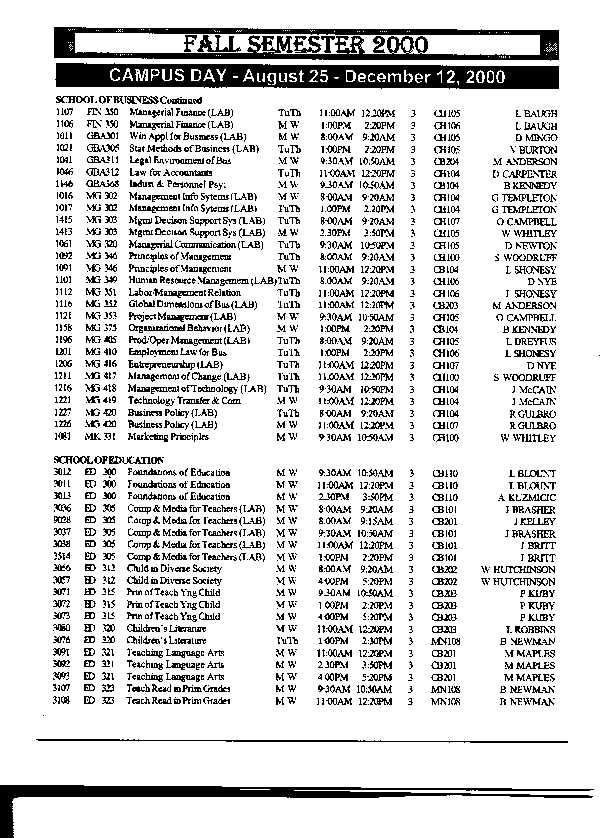
This
subweb was developed by the webmaster to share information on how to apply for
admission to US or Canadian universities or colleges. It reflects experience
of a non-US national and therefore may not be interesting to US nationals.
The
subweb reflects its author’s experience in getting admitted to three US and
one British University in 1994-2001 and studying at three US universities. The
page has both publicly available and insider information as well as opinions of
past and present international students. The information contained herein will
be most useful to Moscow Military University (formerly known as Military
Institute of Foreign Languages) graduates, but graduates of other ex-USSR
institutes and universities, as well as potential applicants from other
countries may be able to get something useful from it. The information will also
address some cultural differences between the US and ex-USSR and the ensuing
tips for applicants form the former USSR.
The
webmaster will stress it right upfront that to get admitted to a US university
may seem difficult to most Russians (graduates of Military University/Military
Institute and not) due to the lack
of funds and other hurdles (including, but not limited to, a lot of paperwork).
However, it is doable, as the webmaster’s example proves.
Provided
you have graduated from Military University/Military Institute (MU/MI), you are eligible to apply for admission to a
university seeking your second Bachelor’s degree, a Master’s, or a Doctorate
degree.
The
structure of the subweb is as follows:
-
Resources available in Russia
-
Availability of funds
-
Tests and examinations
-
Evaluation of educational credentials
-
Personal resources planning
-
Cultural differences to be taken into account
-
Visa and departure
Resources
available in Russia
The
main resource in Russia for prospective applicants to US is the American Center
at the
Each
university publishes its own reference materials. The primary references include
a catalog
(there may be an undergraduate catalog and a graduate one published separately)
and a current schedule. A catalog may be a book 300-500 pages long. It has all
the information about a university. A schedule is essentially schedule of
classes, their time, location, updated fees, other relevant information, 20 or
so pages long. A catalog may be published annually, every two or three years. A
schedule (usually with two or three semesters ahead of the current one) is often
published each semester.
Availability
of Funds
To
be able to apply for admission with a US university, one has to show
availability of sufficient funds. The required amount varies greatly among the
schools in the US, and depends upon local factors, such as local income level,
tuition and other fees at a given university, local standards of living, etc. To
apply and study at a private university is more expensive than at a state one.
In
terms of financial support a potential applicant shall be ready to have the
following:
-
a certain sum of money readily available;
or
-
a certain sum of money as a pledge from a person or institution to be
spent to cover this student’s expenses during the school years. A relevant
form must be filled out in regard to this pledge, called “affidavit of
support”. It may be filled out by a US legal resident or national of any other
country, and must be accompanied by an official statement of a bank or other
relevant institution verifying that the required sum
is available to the individual who signed the affidavit. The amount may be
available in cash or other assets, such as real estate, cars, merchandise, etc.
Pages
from Catalogs of the University of Alabama in Huntsville and Athens State
University with tuition fees are given below (tuition is payment for taking a
course at a school). All international students are non-residents in regard to
tuition fees. The fees change every year, so be sure to have the most recent
information from your university of choice about the current fees.
For
planning purposes you will need to know that an international student must be
taking a full course load during the fall and spring semesters (depends upon
university, on the undergraduate level it is 12 credit hours, or 4 courses, in
most cases, on the graduate level 9 credit hours, or 3 courses, in most cases).
This means that you are able to take more than 4 courses on the undergraduate
level (more than 3 on the graduate level). There is also an upper limit on the
courses that a student can take during one semester.
The schedule for the upcoming semester shall carry information on how
much money an international student must have to start his studies during that
semester.
A
sample page from the Schedule of Athens State University is given below.

The
webmaster’s experience shows that you must have a larger portion of the money
that the affidavit of support, but it is not necessary to have the whole amount.
A student can save on food, clothes, transportation, housing, books, supplies,
and in real life spend less that what is taken into account by universities. All
in all, on such items as the above a student can save from 30% (books, housing)
to 60% (food, clothes). Thus, in reality, you may really need only about 80% of
the money specified in the affidavit of support.
As
of 2000 the US legislation allows international students to apply for work
permit after the first year of studies. There are several grounds for such
application, the most common being “economic hardship”. In most cases, a
student will be knowledgeable enough by the end of the first year of studies to
be able to correctly substantiate the need in obtaining a work permit, and most
such applications are approved by the Immigration and Naturalization Service
(INS). The webmaster’s advice for those who do not have sufficient funds is to
plan to apply for such work permit (official name - Employment Authorization
Document, or EAD, which is a plastic card with photo) after the first year of
studies. The EAD will allow you to work 20 hours a week during school year, and
40 hours during breaks. A student can find a job that may be paying anywhere
between $6 and $10/hour (this does not mean he cannot find a position that will
be paying $40/hour). Thus he may be able to earn a portion of the money for
his studies during the second and subsequent years of school.
In
view of this a student will definitely need an affidavit of support for the
second year for the sum required by the university, but may really need only
about 60% of the money specified therein. During subsequent years a student may
come to the situation where he will need the affidavit of support as a required
document only (not the money), and become self-sufficient. In particular, if a
student is able to take a break from school during his second summer (assuming
he starts classes in the fall he will not be able to work during the first
summer as EAD can be issued only after one year at school) and work 40
hours a week, he may be able to earn a considerable portion of his upcoming
tuition expenses.
Tests
and examinations
The
experience of the webmaster shows that one of the first steps to be taken by a
prospective applicant to a US or Canadian university is getting ready and taking
the Test of English as Foreign Language (TOEFL). This test is required by all US
and Canadian, and, to the best knowledge of the webmaster, most European ones.
TOEFL,
GMAT (Graduate Management Admission Test necessary for a graduate degree in
Business, Management, Accounting, Economics, other disciplines) and a number of
other tests are administered by Education Testing Services (ETS), Princeton, NJ,
USA, or other authorized agencies. All the information on tests, including their time
and locations, tutorials, grading, etc., is available on the Internet site of
ETS (www.ets.com).
Upscale
universities will require a TOEFL score of 600 and higher, and there will be no
schools that will accept an applicant with a score lower than 550. Those who are
seeking admission to journalism or literature schools, shall do their best to
get a score of the 620 order. The author’s experience shows that the higher
the score the less problems an applicant will have to go through during the
process of admission. Naturally, it will be easier to study as well. The author
was using self-preparation tutorials at the American Center in the Library of
Foreign Literature for about six months in 1992-1993, and scored 625 on
his TOEFL in 1993.
Evaluation of educational credentials
Concurrently
with readying for TOEFL a prospective applicant shall submit his diploma and all
other educational credentials for evaluation with an agency whose evaluation is
accepted by the university of choice. The list of mainstream agencies for
evaluating foreign educational credentials is given below.
1. World Education Services
P.O. Box 745 - Old Chelsea Station
New York, NY USA 10113-0745
Tel.: (212) 966-6311
2. Education Credentials Evaluators, Inc.
P.O. Box 92970
Milwaukee, WI USA 53202-0970
Tel.: (414) 289-3400
3. International Education Research Foundation
(formerly Credentials Evaluation Services)
P.O. Box 66940
Los Angeles, CA USA 90066
4. International Consultants of Delaware, Inc.
109 Barksdale Professional Building
Newark, DE USA 19711
5. International Evaluation Service
(formerly Indo-Chinese Document Evaluation Translation)
P.O. Box 20348
Long Beach, CA USA 90801
6. International Education Evaluation, Inc.
363 Ridgewood Avenue
Charlotte, NC USA 28209
Each of the evaluation agencies will have several options of evaluating foreign educational credentials. A prospective applicant should choose the following option:
Course-by-Course.
Before
sending his credentials to an agency an applicant should consult the catalog of
a university (most universities will have this information on their Internet
sites) and make sure that the university will accept the evaluation of that
agency. These requirements are updated annually, so do your best to find the
most recent information. None of the Russian agencies doing this kind of
evaluation are known to be acceptable to US universities, so do not waste time
and money getting them to evaluate your credentials.
One
problem with Soviet and Russian diplomas is that neither diploma or supplement
to diploma do not show hours spent on each particular course. Courses at
American universities have their value expressed in credit hours, which are
calculated on the basis of total hours spent on each course and types of
activities that the students are engaged in while taking this course. To address
this a what is sometimes called “arkhivnaia spravka” is needed. This
document in the best case shows all the courses taken during all years of study,
how many hours were spent on each course during each semester, what course
papers were written and when, what practical training (internship) was completed
and when, and other relevant details. In the case of Military University
(Institute) this document may or may not be classified, however, it is needed
for the best possible evaluation. The webmaster did not have and did not try to
obtain that kind of document, and it may have been one of the reasons for his
evaluation to be inaccurate.
The
webmaster believes that World Education Services (WES) is the agency of choice
of the clear majority of US universities and colleges. The webmaster has
experience of dealing with this and one other agency, namely
The
webmaster has some expertise in foreign studies, and on the basis of it, his
conversations with university professors, as well as foreigners who submitted
their credentials for evaluation to WES, it can be stated that WES’s
evaluations often have major flaws.
In particular, both the webmaster’s and his wife’s credentials were
evaluated with a significant number of errors and inaccuracies (described in
more detail below). However, provided that WES’s evaluations are widely
accepted there is sort of no-choice situation in most cases.
The
first evaluation that the webmaster received from WES was totally unacceptable.
The webmaster had to go line-by-line with his original educational credentials
and the evaluation to discover distortions, omissions and inaccuracies. The
author had then to resubmit the results of his check back to WES. WES
reevaluated his credentials to reflect most, but not all objections and
suggestions. WES’s revised evaluation of the author’s educational
credentials is given below.
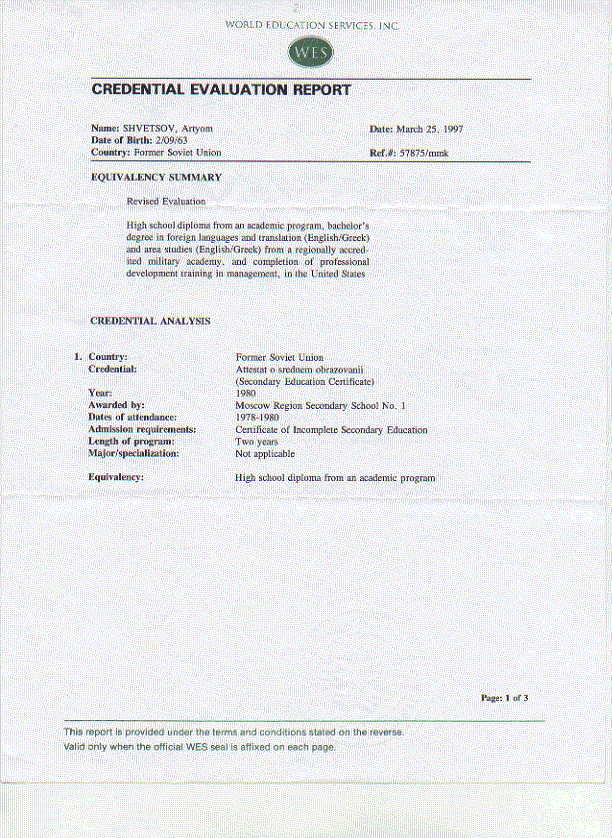
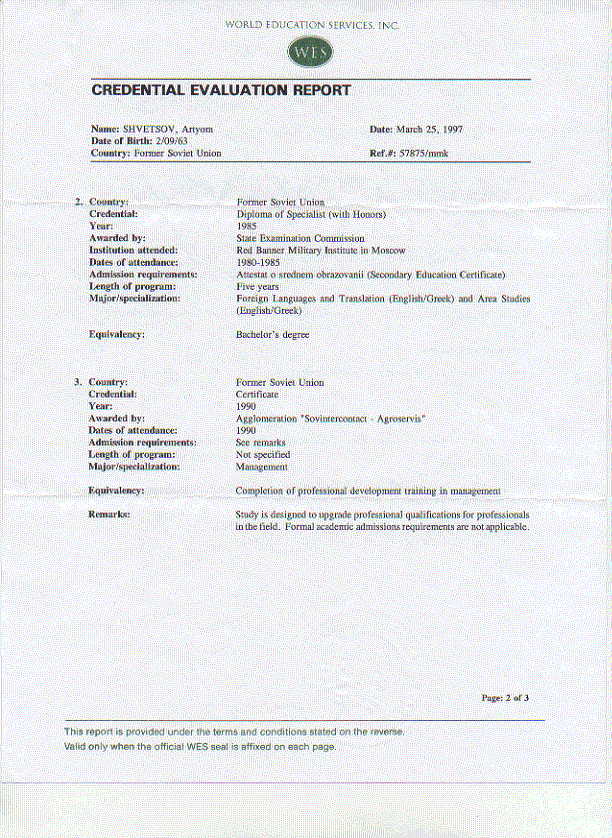
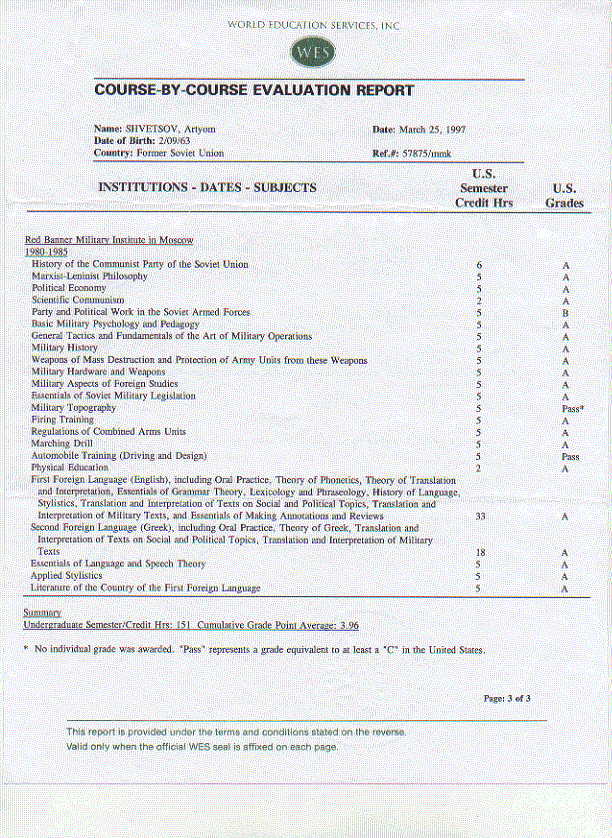
Real
life shows that WES and other agencies after receiving all the materials
required for evaluation will often later ask that original diplomas and other
credentials be sent to them for verification (initially only verified and
translated copies are to be sent). The experience of dealing with these agencies
shows that in most cases this cannot be avoided. Applicants living in the former
USSR should only use one of the international courier services (UPS, FedEx or
DHL). The package should be insured for not less than $10,000. The package
should be sent so that a signature of the recipient’s representative is
obtained and sent back to sender.
The
author first came to the US as Hubert H. Humphrey Fellow. The Humphrey
Fellowship Program is sponsored by the US State Department and administered by
USIA. It is a non-degree program for mid-career professionals for graduate or
doctorate education and research in the US. The webmaster stayed at Rutgers, the
State University of New Jersey at its New Brunswick campus in 08/1994-07/1995.
The Humphrey Fellows were assigned to the Department of Urban Planning and
Development, but were taking courses at all campuses and with any College they
needed.
In
08/1995 - 12/1997 the author studied at the University of Alabama in Huntsville
(UAH, www.uah.edu), at the College of Administrative Science, and earned a
Master of Science in Management degree. He was also Graduate Teaching Assistant
with the Department of Economics and Finance, chaired by Dr. Chris W. Paul II at
that time. In 05/1999-05/2001 he is enrolled with Athens State University (www.athens.edu),
in Athens, AL, and is getting his Bachelor’s in Computer Science degree. Some
of the examples to illustrate the author’s points on this page are drawn from
the catalogs of the universities the author attended.
Bachelor’s
Program
A
typical Bachelor’s program at a US university will require about 130 semester
credit hours. The majority of courses have 3 credit hours, though a few may be 2
or 4 credit hours worth, so on the average one has to take and pass
45 courses to get this degree. All courses have an alphanumeric index,
with the first two letters usually standing for the abbreviation of the course
title, the next digit indicating the year (recommended or implied) of study, the
next two digits indicating the level of difficulty of the course on the scale
from 00 (the easiest) to 99 (the most difficult).
All
US universities will accept credits transferred from other educational
institutions. To transfer a credit means to count a previously taken course into
the course count for a currently earned degree. An applicant should be
interested in transferring as many courses from his previous education as
possible, as it cuts the time needed to obtain a new degree and leads to
considerable money savings. Unfortunately, there are only a few courses that can
transferred from an evaluated Military University/Military Institute (MU/MI)
Diploma to a US university.
The
courses required for a Bachelor’s degree will usually consist of two groups.
As an example, the program requirements for a degree of Bachelor in Computer
Science at Athens State University are given below (this is an excerpt from the
1999 ASU catalog):
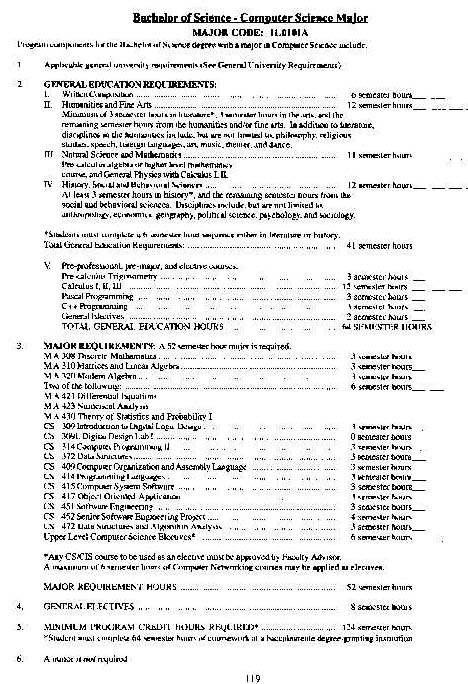
Section
1 concerns school education, TOEFL and results of other applicable tests for
international students. In most cases, this section should not concern any
graduate of MU/MI. For reference,
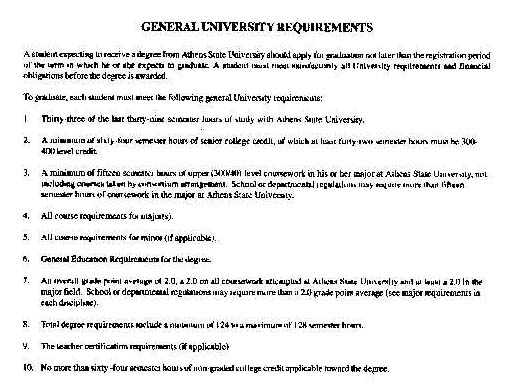
Section
2, General Education Requirements, is subdivided into 5 paragraphs. We will here
discuss each of them as applicable to applicants - graduates of MU/MI.
I.
Written Composition. 6 semester hours.
If
you had English as first or second language, all six semester credit hours will
be transferred from a MU diploma.
II.
Humanities and Fine Arts. 12 semester hours.
These
courses will be transferred from a MU (MI) diploma
III.
Natural Science and Mathematics. 11 semester hours.
Before
1985 the courses from this group were not taught to students of Department of
Western or Eastern Languages. The webmaster is not familiar with the current
situation. These courses will include Physics, Chemistry, Astronomy, Nutrition,
and similar courses. An applicant will decide on which exactly courses to take
after his admission. The student’s choice of these courses should be discussed
with the student advisor.
The
webmaster’s evaluated Military Institute diploma did not have a single course
of this group. He was able to transfer 6 credit hours from his M.S.M. degree,
and had to take two courses (Chemistry 402 and Introduction to Astronomy 300)
for his degree in Computer Science.
IV.
History, Social and Behavioral Sciences. 12 semester hours.
These
courses can be transferred from a MU/MI diploma.
V.
Pre-professional, pre-major, and elective courses.
To
the best of webmaster’s knowledge, none of these courses were or are currently
taught at the School(s) of Foreign
Languages at MU/MI. An MU/MI graduate will have to take them.
Section
3. Major requirements.
To
the best of webmaster’s knowledge, none of these courses were or are taught at
School(s) of Foreign Languages at MU/MI. Some may be taught at other schools. If
they were not taken previously, a student will have to take them.
Section
4. General Electives. 8 semester hours.
These
courses can be transferred from a MU/MI diploma.
Calculating
the bottom line, a graduate of a School of foreign languages of MU/MI will in
the best case be able to transfer the following number of credits from his MU/MI
diploma:
Section
2, P. I
6
Section
2, P. II
12
Section
2, P. III
0
Section
2, P. IV
12
Section
2, P. V
0
Section
3
0
Section
4
8
Total
38
Thus
all in all 38 credits can be transferred from a MU/MI School of foreign
languages graduate for a Bachelor’s degree in Computer Science. We would like to note that this will be the best case, often unattainable in real
life. Reasonably thinking, you should be glad if you get about 30 semester
credits from the above diploma transferred into a degree in Computer Science.
This
will leave a student with about 100 credit hours to be earned. A reasonable
course load will consist of 5-6 courses of levels 1 and 2 per semester, and 4-5
courses of higher level per semester. Most of the courses that will be
transferred from a MU/MI diploma, will count as Level 1 or Level 2 courses. Thus
a tentative plan will include about 33 courses, including about 10 of Level 2,
and the rest of Level 3 and Level 4.
All
universities have summer semesters, and many regular (3 credit hour) courses are
taught during summer. So if a student is planning to study during three
semesters a year until he graduates, it may take him 8 semesters (2 years and 9
months if he starts his studies in a fall semester).
Master’s
Degree
A
typical Master’s degree will require about 36 semester credit hours. The
majority of courses at this level have 3 credit hours each, with several courses
weighing 4 hours. There will be prerequisites for a Master’s degree depending
upon the area of specialization. You will find an excerpt from the University of
Alabama in Huntsville (UAH) Graduate Catalog for 1999-2001 concerning the degree of
Master of Science in Management below.
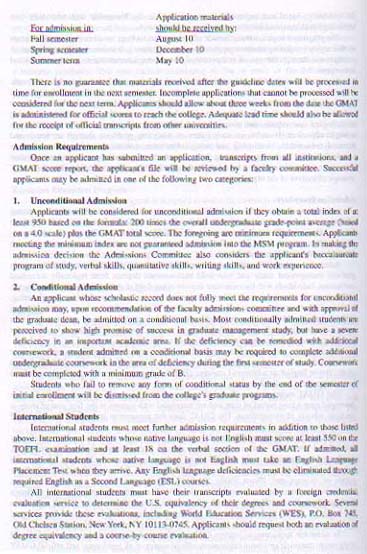
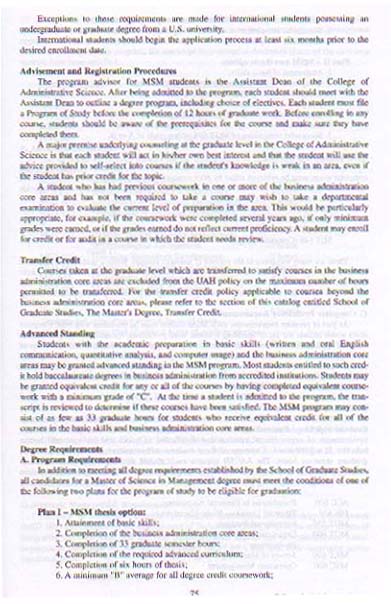
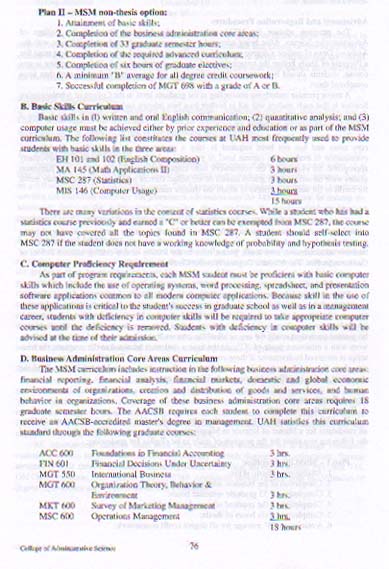
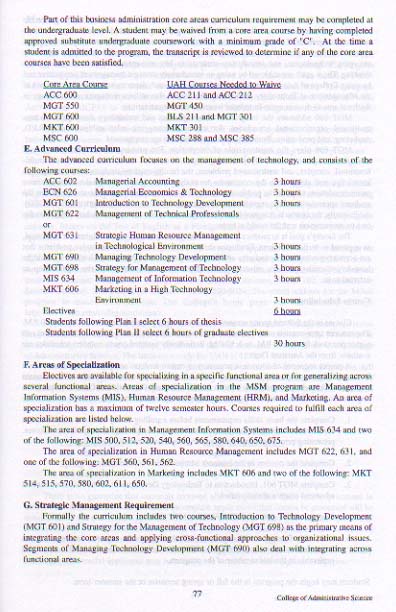
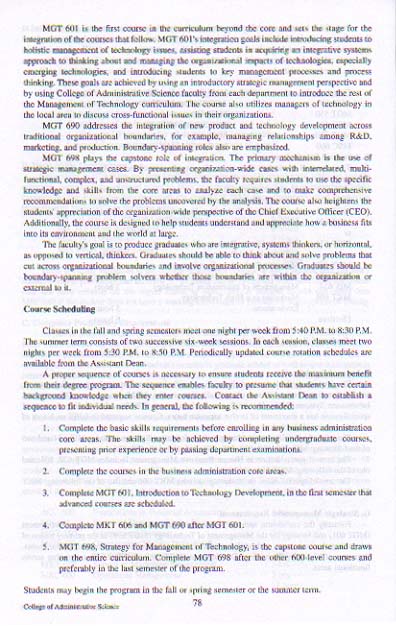
As
you see in Basic Skill Curriculum paragraph, there are 5 prerequisite courses
for the M.S.M program (prerequisite means you must have taken or must take them
in order to get this degree). Out of these, a graduate of MU/MI will be able to
transfer EH 101 and 102 from a MU/MI diploma, and will have to take the
remaining three courses.
As
you can see in Section “Business Administration Core Areas Curriculum”, one
will have to earn 18 credit hours of courses from this group. If the only
diploma you have is the one from MU/MI and you want to earn a M.S.M. Degree from
UAH, you will have to take:
Prerequisites:
MA
145, MSC 287, MIS 146
Subtotal
9 credit hours
Business
Administration Core Areas Curriculum:
ACC
600, FIN 601, MGT 550, MGT 600, MKT 600, MSC 600
Subtotal:
18 credit hours
Advanced
Curriculum:
ACC
602, ECN 626, MGT 601, MGT 622 or MGT 631, MGT 690, MGT 698, MIS 634, MKT 606, 2
elective courses
Subtotal:
30 credit hours
Total
credit hours for M.S.M. degree:
57
An
international graduate student must be taking a full courseload during fall and
spring semesters, which is 3 courses at this university. If a student decides to
study during summer, and take 3-4
graduate courses during each semester, in other words, vigorously pursue the
degree, it is possible to finish degree studies during 5 semesters, or 21
months. If a student decides not to study during summer, 5 semesters will extend into
28 months. If one decides to go by the minimum required courseload (3 courses)
and take breaks during summer, the studies will take 6 semesters and last 33
months (a student will have to take 4 courses during one semester).
If
you have taken any courses in Russia from an affiliate of a British or any other
European university, you may be able to transfer some credits to your M.S.M.
program.
An
international student may once face a situation when he has one or two courses
left to finish his degree. Under such circumstances he will have to take three
courses though one or two will be redundant. It happens because an international
student is not allowed to take less than 3 graduate courses a semester. Thus, to
maintain your legal status in the US, you will have to take not less than 3
courses during each semester even if you do not need but one for the last
semester (and pay for three courses, including two that you do not need). In
view of this it is advisable to plan one’s program of study in advance and
thoroughly enough to avoid this situation.
Cultural
differences
An
individual from Russia seeking admission to a US university must comprehend some
cultural differences to avoid counting on factors playing in Russia, but not in
the US. We are not discussing what is better and what is worse here, just giving
some tips and a broader cultural context to nip the unsubstantiated expectations
in the bud.
Most
differences flow from the US being a state of law (Russia is considered an area
of lawlessness). One consequence of this is that the approach in Russia is that
even during the age of technological progress a human being continues to play a
major part (e.g. in functioning of a company, university admission procedures,
modern war, etc.). This approach may well work in the current Russian
environment, but it will never work in the US.
The
US approach is exactly the opposite. In the state of law, such as the US,
every individual should play a role of a reliable “screw” (Russian
allegoric reference) and fulfill his duties exactly how they are prescribed by
law (regulation, ordinance, policy, rule, etc.). As a result, every individual
performs his duties, in most cases exactly how it is written somewhere (not a
bit less, not a bit more), and almost always is excellent in doing that. There
are rules in the US that prescribe most every human activity, and all the
procedures for admitting students to a university are described in detail at
every university. There can and will be no exceptions to the rules, except when
these exceptions are included in the rules. Every US university official that a
prospective Russian applicant should deal with, will be following
some kind of rules, and an applicant should not ask anybody to do
something in excess of the rules or to do something as an exception. Any
requests of this kind will be to the applicant’s disadvantage and may even
undermine all his efforts for enrollment. There can be no favors or
possibilities to understand one’s inability to do something. A US official
will not be interested in why you cannot do this or that, the only thing he will
want to know is if you will do it or you won’t. If yes, your admission goes
ahead, if not, admission procedure is suspended or canceled. One mention of you
paying someone back at a later time if someone helps you get admitted (practice
widely accepted in Russia) will result in immediate cancellation of your
admission procedures and your inability to get admitted pretty much anywhere in
this country in the future due to the exchange of relevant information among
universities.
Do
not get offended by somewhat impersonal attitude of many university officials you
will be talking to or dealing with during the admission process and the first
weeks of your stay at a university. Do not ever try to cheat, deceive, defraud
or outsmart anybody. If you are an honest and creditworthy person, do your best
in abiding by law during the admission process and during your studies, earn the
trust of the Americans that you will be dealing with, and many of the same
university officials will become your friends and will go their extra mile for
you when and if needed.